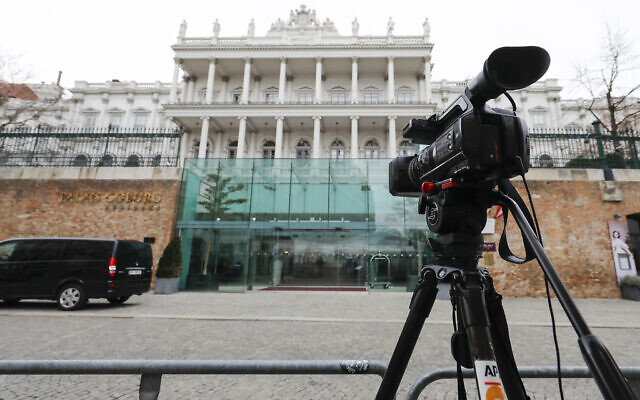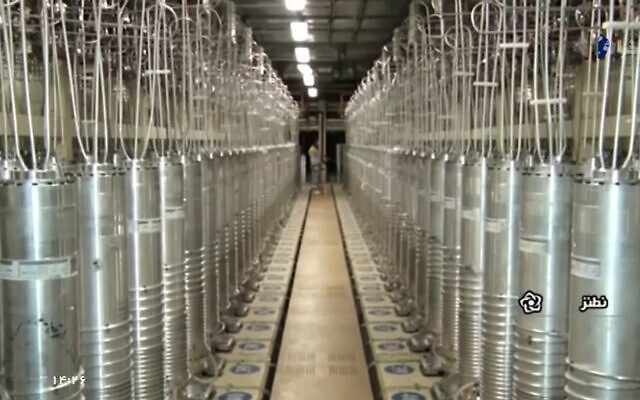Iran has defied Western countries by carrying out work on near-weapons grade enriched uranium that will make it harder to implement the terms of any revived nuclear deal with world powers, Reuters reported Wednesday.
The work carried out earlier this month was to convert the uranium into a type that is less easily recovered and diluted so that it can then be removed from the country, according to an International Atomic Energy Agency report issued to member states last Thursday and seen by Reuters.
It came as negotiations continue in Vienna to save the so-called Joint Comprehensive Plan of Action, a pact that aimed to prevent Iran from developing nuclear weapons but has been in tatters after the US pulled out in 2018. Since then, Iran has dropped some of its own commitments, enriching uranium to levels beyond those in the deal and that the IAEA says are only used by states seeking a weapon.
Converting uranium into a different form in the manner Iran has done way will make it harder to implement any agreement for it to return to lower limits of enriched uranium laid out in the JCPOA.
Diplomats say that the emerging agreement will require Iran to dispose of its uranium enriched above 3.67%. Iran’s most enriched uranium is at 60%, a short technical step from 90% weapons grade, and it has about 33 kg of the material.
Until the recent work, it was all in the form of uranium hexafluoride, which can be easily diluted and transported, something that has been under discussion for months at the Vienna talks, Reuters reported.
However, between March 6-9, Iran transformed 2.1 kg of up to 60% uranium from one form into 1.7 kg of another form. The process produced molybdenum 99, and another a medical radioisotope. However, the enriched uranium then requires processing to recover it from the resulting materials.
In a joint statement last week, the Britain, France, and Germany specifically warned Iran against carrying out the work, saying that doing so would have consequences for returning to the terms of the JCPOA.
“We strongly urge Iran to avoid undertaking any new escalations and in particular, call upon Iran to immediately cease all activity related to conversion of highly enriched uranium, which will have practical implications for returning to JCPOA limits,” they said at the time.
Deal close
Washington said Wednesday it was “close” to a deal with Iran on reviving the 2015 pact that saw Western powers provide sanctions relief in exchange for curbs on Tehran’s nuclear program, the latest sign of advancement following prolonged deadlock.
Days after Russian demands seemed to jeopardize talks in Vienna over restoring the pact, this week has seen multiple signals that an accord may at last be within reach, including the release of two British Iranians Wednesday after years of detention in Iran, and word that outstanding issues have narrowed to just two.

A general view of Palais Coburg, the site of a meeting where closed-door nuclear talks with Iran take place in Vienna, Austria, on February 8, 2022. (Lisa Leutner/AP)
The negotiations began last April between Britain, China, France, Germany, Iran and Russia, with the United States taking part indirectly.
Now a successful resolution appears more viable than at any point in years.
“We are close to a possible deal, but we’re not there yet,” said US State Department spokesman Ned Price. “We do think the remaining issues can be bridged.”
Speaking to reporters, Price declined to confirm Tehran’s claim that there were just a pair of final issues to be sorted out, down from four, before agreeing to restore the six-party JCPOA.
But he said the issues are surmountable, although the 11-month-old talks “are at a very delicate stage.”
“There is little time remaining given the nuclear advancements that Tehran has made” toward developing nuclear weapons that would undermine any agreement, he said.
The EU diplomat chairing the Vienna talks, Enrique Mora, told reporters last week that delegations were down to negotiating the footnotes of the text, but progress stalled when Moscow demanded guarantees that Western sanctions over its invasion of Ukraine would not affect its trade with Iran.
However, Russian Foreign Minister Sergei Lavrov indicated Tuesday that Russia had received “written guarantees” from Washington.

Various centrifuge machines line a hall at the Natanz Uranium Enrichment Facility, on April 17, 2021. (screenshot, Islamic Republic Iran Broadcasting – IRIB, via AP)
The deal began to fall apart in 2018 when then-US president Donald Trump dramatically withdrew from it and went on to reimpose swinging economic sanctions on Iran.
That led Tehran to exceed the limits on its nuclear activity laid down in the deal.
Iran said Wednesday there were two remaining sticking points in Vienna, including an “economic guarantee” in case a future US administration repeats Trump’s abrogation.
Another source close to the talks said the other issue was the status of Iran’s powerful Revolutionary Guards, which Washington has branded a terrorist organization.
Read More:Iran defies Western powers with enriched uranium work it was warned not to do
2022-03-17 07:03:41

